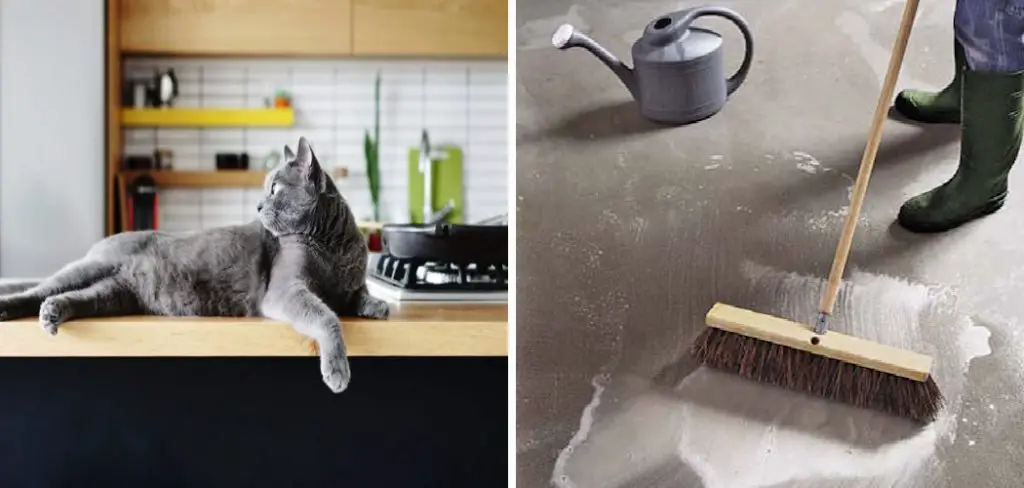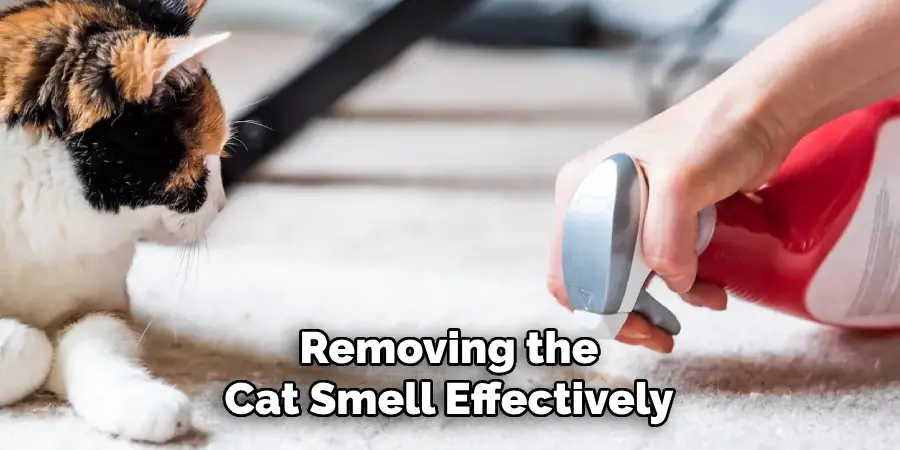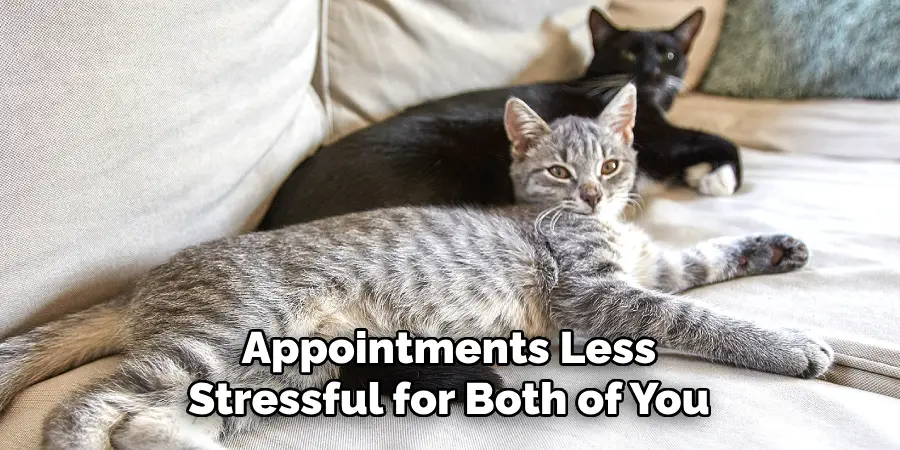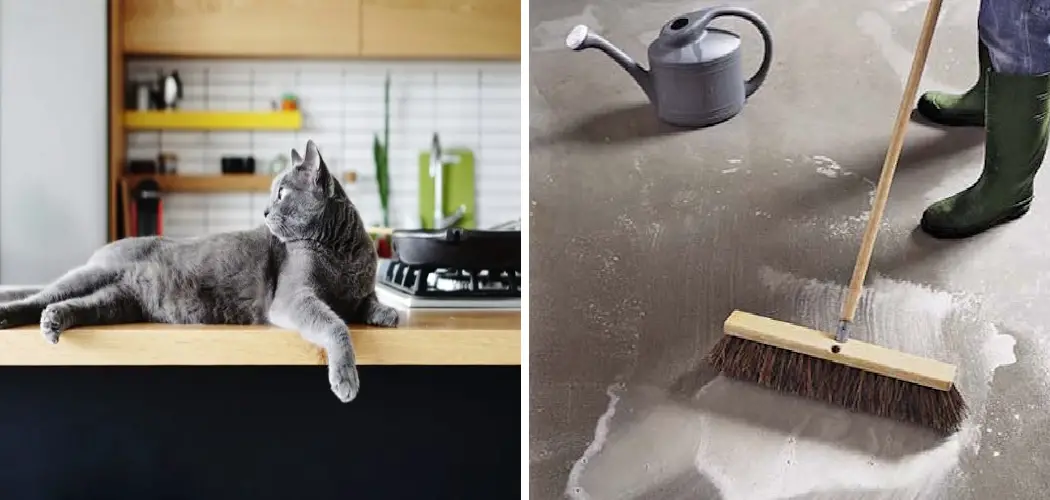Having a lingering cat smell in your garage can be both unpleasant and challenging to remove. Whether it’s due to a stray cat taking shelter or your own pet using the space as a makeshift litter box, it’s essential to address the issue effectively.

This guide on how to get cat smell out of garage will provide you with practical tips and methods to eliminate the odor, leaving your garage fresh and odor-free.
Why Is There a Cat Smell in Your Garage?
Before we dive into the various methods to tackle cat smell, it’s crucial to understand why your garage may have a lingering feline odor. Here are some common reasons:
Stray Cats:
If you live in an area with a high stray cat population, it’s not uncommon for them to seek shelter in garages. They may spray or mark their territory, leaving behind a strong cat smell.
Pet Accidents:
If you have cats or other pets that use the garage as a litter box, accidents can happen. Cat urine has a potent odor and can quickly permeate through surfaces and linger in the air.
Storage of Cat-Related Items:
Your garage may smell like cats if you store items such as litter boxes, food bowls, or toys. These items absorb smells over time and can contribute to the overall cat odor in your garage.
9 Steps on How to Get Cat Smell Out of Garage
Step 1: Clean Up Any Pet Accidents
The first step to eliminate cat smell from your garage is to clean up any pet accidents thoroughly. Use an enzymatic cleaner specifically designed for pet odors to break down the compounds in cat urine that cause the lingering smell. Start by blotting any wet spots with paper towels or a cloth, then apply the enzymatic cleaner to the affected area.
Allow it to sit for the recommended amount of time before wiping it clean. For tougher stains or odors on concrete floors, consider using a scrub brush to ensure the cleaner penetrates deeply into the surface. Properly addressing these accidents is crucial to removing the cat smell effectively.

Step 2: Clean and Disinfect the Litter Box
Another important aspect of eliminating cat smell is regularly cleaning and disinfecting your cat’s litter box. Cats are clean animals, and if their litter box is dirty or smells bad, they may avoid using it altogether. This can lead to their urinating in other areas of your home, causing more unpleasant odors.
To properly clean and disinfect the litter box, start by removing all used litter and debris. Then, wash the box with hot water and a mild detergent. Rinse thoroughly before drying completely. Once dry, spray the inside of the box with a mixture of one part water and one part white vinegar. Let it sit for 10-15 minutes before rinsing and drying again. This will help eliminate any lingering odors and disinfect the box.
Step 3: Replace the litter
After cleaning and disinfecting the box, it’s important to replace the litter with fresh, clean litter. When choosing a litter, consider your cat’s preferences and any potential health concerns. Some cats prefer scented or unscented litters, while others may need a dust-free option.
There are various types of cat litter available, including clay-based, silica gel crystals, natural materials like pine or corn, and even recycled paper options. It’s important to choose a litter that is safe for your cat and easy to maintain. Avoid using clumping litters if you have a kitten as they may accidentally ingest it.
Step 4: Litter Box Placement
Now that you’ve chosen the right litter for your cat, it’s important to consider where you will place the litter box in your home. Cats prefer privacy when using the litter box, so it’s best to avoid placing it in a high-traffic area or near loud appliances.
Additionally, make sure the litter box is easily accessible and not too far from where your cat spends most of their time. It should also be placed away from food and water bowls as cats do not like to eliminate near their food source.
Step 5: Cleaning and Maintenance
Proper cleaning and maintenance of the litter box are crucial for keeping your cat happy and healthy. It’s recommended to scoop out solid waste at least once a day and change the litter entirely every 1-2 weeks. This will help prevent odors and keep the litter box fresh for your cat to use.
In addition to regular scooping and changing of litter, it’s essential to clean the litter box itself. Every few weeks, empty out any remaining litter and wash the box with mild soap and warm water. Make sure to dry it completely before adding new litter.
Step 6: Groom Your Cat Regularly
Grooming your cat not only helps keep their coat healthy and shiny, but it also allows you to bond with them. Brushing your cat’s fur regularly removes dead hair, prevents matting, and distributes natural oils throughout their coat.

You should also check your cat’s ears and eyes during grooming sessions. Clean any visible dirt or discharge from their ears using a damp cotton ball, and gently wipe around their eyes with a soft cloth.
Step 7: Monitor Your Cat’s Health
Regular vet check-ups are crucial for maintaining your cat’s health. It’s recommended that annual visits be scheduled for routine vaccinations and physical exams. If you notice any changes in your cat’s behavior or appearance, such as weight loss, excessive shedding, or lethargy, it’s important to take them to the vet for a check-up. In addition, be sure to monitor their litter box habits and report any changes to your vet.
It can also be helpful to keep track of your cat’s vaccinations and medical history. This information can be useful in case of emergencies or if you need to switch vets.
Step 8: Provide Mental Stimulation
Cats are intelligent creatures and need mental stimulation in addition to physical exercise. This can include interactive toys, puzzle feeders, or even training sessions.
Providing these activities not only keeps your cat entertained but also helps prevent behavioral issues such as destructive scratching or excessive meowing.
Step 9: Grooming
Proper grooming is essential for your cat’s health and well-being. Depending on the type of fur your cat has, they may require regular brushing to prevent mats and hairballs. Some cats may also need their nails trimmed regularly to prevent them from becoming too long and causing discomfort. Additionally, it is important to periodically check your cat’s ears and teeth for any signs of infection or dental issues.
Following these steps on how to get cat smell out of garage will not only eliminate any unpleasant odors but also keep your cat healthy and happy.

Frequently Asked Questions
Q1: How Often Should I Clean My Cat’s Litter Box?
A: It is recommended to scoop your cat’s litter box at least once a day and completely replace the litter every 2-3 weeks. However, if you have multiple cats, it may be necessary to scoop more frequently or replace the litter more often.
Q2: How Can I Keep My Cat’s Fur Clean and Less Smelly?
A: Regular grooming is key to keeping your cat’s fur clean and free of any unpleasant smell. Brushing your cat’s fur at least once a week helps remove any loose hair, dirt, and debris. You can also use cat-specific wipes or dry shampoo for quick touch-ups in between grooming sessions.
Q3: What Should I Do if My Cat is Not Eating?
A: If your cat suddenly stops eating, it could be a sign of an underlying health issue. It is important to consult with your veterinarian to determine the cause and proper treatment. In some cases, changing the type or brand of food may also help stimulate your cat’s appetite.
Q4: Is It Necessary to Take My Cat to the Vet Regularly?
A: Yes, it is recommended to take your cat to the vet for regular check-ups at least once a year. Cats age much faster than humans, so annual visits can help catch any potential health issues early on. Additionally, your veterinarian can provide necessary vaccinations and discuss any changes in behavior or diet that may require attention. Regular vet visits also help build a trusting relationship between your cat and their doctor, making future appointments less stressful for both of you.

Conclusion
In conclusion, taking proper care of your cat’s grooming, health, and living environment is essential for their overall well-being. By staying attentive to their needs and maintaining a clean, odor-free space, you can ensure your feline friend remains comfortable, healthy, and content.
A little effort and consistency go a long way in creating a happy and harmonious life for both you and your cat. Thanks for reading this article on how to get cat smell out of garage.
I am Rick. I grew up helping my dad with his handyman service. I learned a lot from him about how to fix things, and also about how to work hard and take care of business. These days, I’m still into fixing things- only now, I’m doing it for a living.
I’m always looking for new ways to help people grow and develop. That’s why I have created this blog to share all my experience and knowledge so
that I can help people who are interested in DIY repair.

